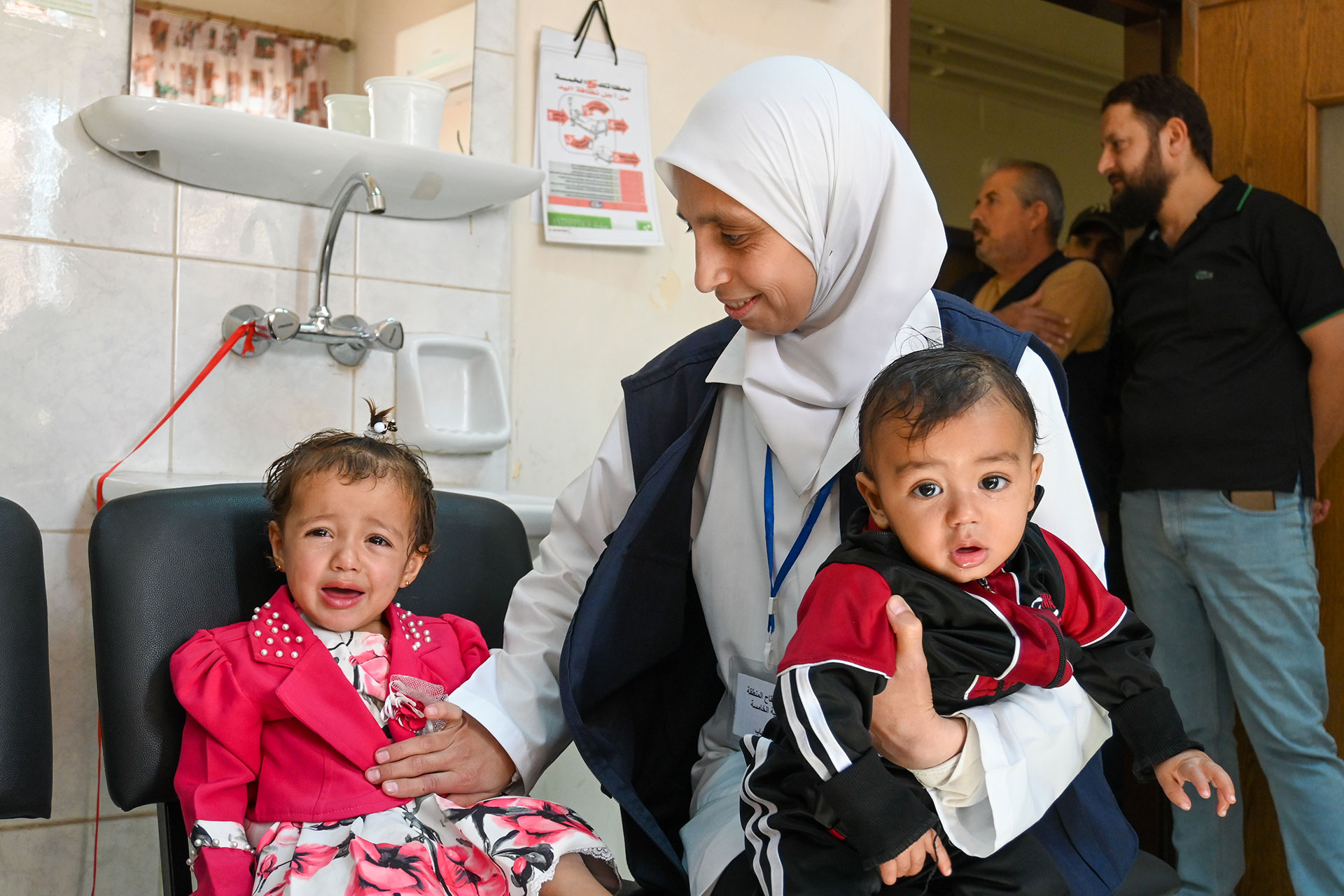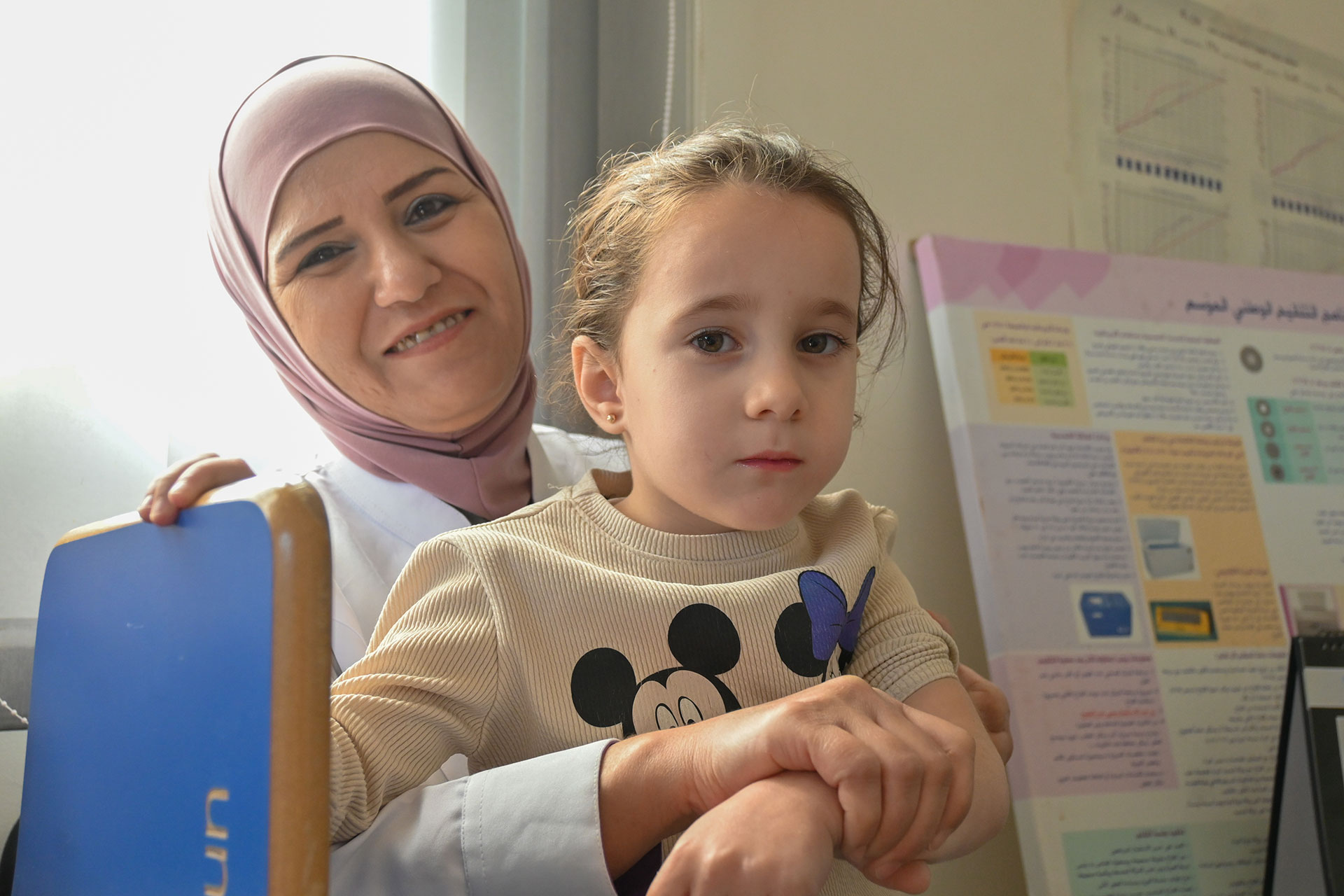13 November 2025 – Damascus, Syrian Arab Republic - At Barzeh Al-Balad Health Centre in Damascus, 35-year-old Yousra smiles as she holds her daughter’s newly issued vaccination card. “It feels good to be back home and to know my children are protected,” she says.
 Miriam Chehab, a vaccination officer, comforts Yousra’s children after they received their routine vaccines at Barzeh Al-Balad Health Centre in Damascus. Photo credit: WHO
Miriam Chehab, a vaccination officer, comforts Yousra’s children after they received their routine vaccines at Barzeh Al-Balad Health Centre in Damascus. Photo credit: WHO
Yousra returned to Syria a month ago after nearly a decade in Lebanon. During her years of displacement, she struggled to keep up with her children’s vaccination schedule. Frequent moves and limited access to services meant her two-year-old daughter, Lyn Saleh Al-Akklah, missed several routine doses.
“When we came back, I didn’t know where to start,” she recalls. “Then one day, a community health worker approached me in the market and told me about the national catch-up campaign. I brought my children the next morning.”
At the centre, nurses reviewed her vaccination card from Lebanon and updated it with the vaccines Lyn had missed. “The team was kind and patient,” Yousra says. “They explained each vaccine and scheduled the next visit. I felt reassured.”
Now pregnant with her third child, she says resuming vaccinations is part of starting over. “After so many years abroad, I finally feel settled. I want my children to grow up healthy here in Syria.”
Continuing care for families
Across Damascus, parents like Aisha Mohammed are also ensuring their children are protected.
At Masaken Barzeh Health Centre, seven-year-old Lyn Mohammad Semaan Al-Zoubi continues to receive her vaccines on schedule. The centre is close to their home, and her mother, Aisha, regularly brings her follow-up appointments.
 A vaccination officer in Damascus, holds seven-year-old Lyn Saleh Al-Akklah after checking her vaccination status at Barzeh Al-Balad Health Centre. Photo credit: WHO
A vaccination officer in Damascus, holds seven-year-old Lyn Saleh Al-Akklah after checking her vaccination status at Barzeh Al-Balad Health Centre. Photo credit: WHO
The surrounding neighbourhood was heavily damaged during the conflict, but the rehabilitated health centre has remained an anchor for families seeking consistent care. Supported by the Ministry of Health, the centre has been part of wider national efforts to restore essential health services and strengthen routine immunization. “The nurses know my daughter and always take time to explain,” Aisha says. “It feels safe and familiar — I know she is protected.”
Reaching every child
Supervising these efforts is Miriam Chehab, a vaccination officer managing five health centres across the district. She has worked in the Expanded Programme on Immunization since 2012.
“I’ve seen families returning after displacement and others who never left but kept coming regularly,” she says. “This year we are seeing more awareness and trust.”
To reach hesitant parents, vaccination teams rely on dialogue and outreach. “We work with volunteers and community health workers in markets, schools and places of worship,” she explains. “Mobile teams also help reach families who cannot travel to health centres.”
Reaching these areas is not always easy. In As-Sweida, for instance, teams had to navigate mountainous terrain and remote villages amidst a volatile security situation to reach children who had missed their vaccines. Despite the challenges, they managed to reach over 15,700 children across the governorate — many of them in hard-to-access communities where health services remain limited.
 A health worker administers an oral polio vaccine to a young girl during a door-to-door outreach activity in Damascus. Photo credit: WHO
A health worker administers an oral polio vaccine to a young girl during a door-to-door outreach activity in Damascus. Photo credit: WHO
Miriam hopes the progress seen during the Big Catch-Up will strengthen routine immunization nationwide. “As Syria rebuilds, our goal is not just to recover what was lost, but to make the system stronger – so every child can be reached on time.”
Families like Yousra’s and Aisha’s are among hundreds of thousands across Syria who have benefited from the nationwide Big Catch-Up campaign, led by the Ministry of Health with support from WHO, UNICEF and Gavi, the Vaccine Alliance.
The activity covered 13 governorates, with an ongoing measles rubella vaccination campaign in northern Aleppo and Idlib from 2 to 13 November 2025. To date, health workers have screened the vaccination status of over 1.7 million children under five and vaccinated over 270,000 of them. Around 15,500 children had never received any vaccine — all have now been reached. In parallel, more than 1.6 million children received the measles, mumps and rubella vaccine and vitamin A supplements.








